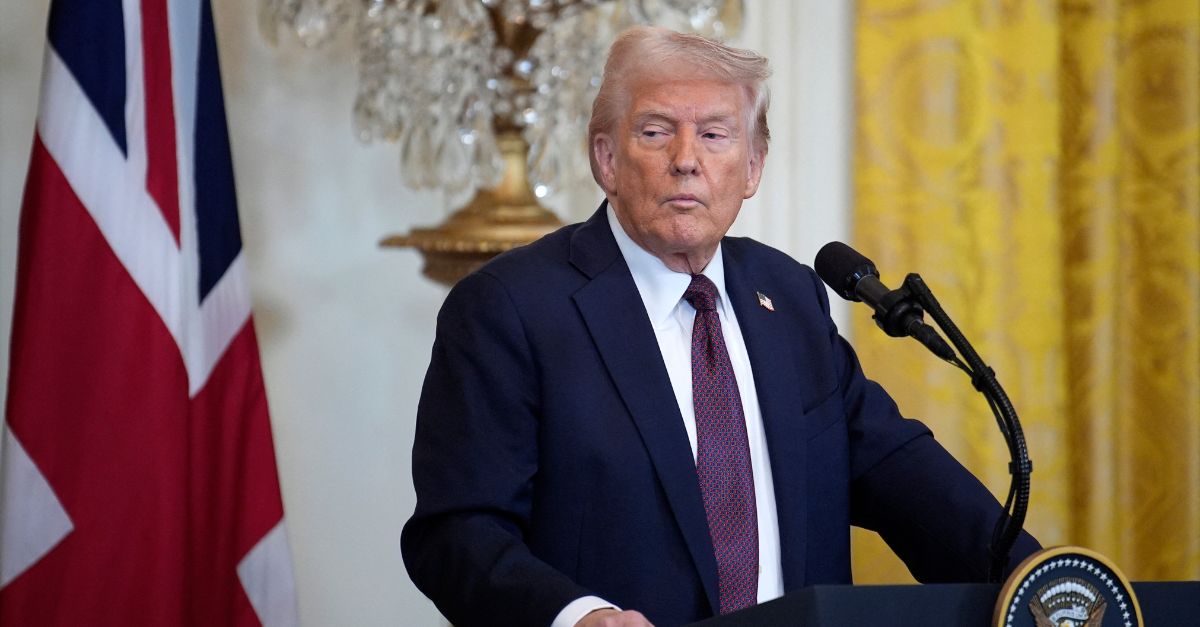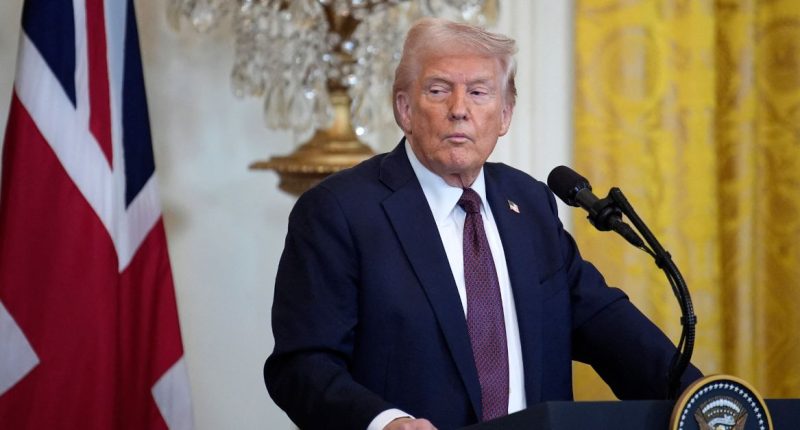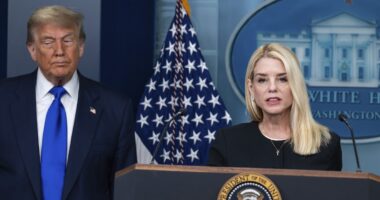
President Donald Trump at a press conference at the White House in Washington on Feb. 27, 2025 (Yuri Gripas/Abaca/Sipa USA; via AP Images).
The Associated Press is asking a federal judge in Washington, D.C., to issue a temporary restraining order requiring the White House to restore the news organization’s access to the press pool for certain presidential events following claims it was being unconstitutionally punished for refusing to refer to the Gulf of Mexico as the “Gulf of America.”
The AP on Monday filed an amended complaint, which comes less than a week after the Trump administration seized control of the White House press pool for the first time in decades, marking an uptick in the administration’s battle with news outlet’s reporting on the president. Traditionally, the pool has been chosen by the White House Correspondence Association in conjunction with news organizations covering the president.
The AP’s initial lawsuit was filed on Feb. 21, and named as defendants White House press secretary Karoline Leavitt, White House deputy chief of staff Taylor Budowich, and White House chief of staff Susan Wiles. The 32-page amended complaint, which nearly doubled from the 18-page original, begins with a quote from an anonymous White House adviser who spoke to the news site Axios on Feb. 25, 2025.
“The AP and the White House Correspondents Association wanted to f–k around. Now it’s finding out time,” the adviser reportedly told Axios.
According to the amended complaint, the administration’s actions violate both the First and Fifth Amendments of the U.S. Constitution.
“The White House ban of the AP violates the Due Process Clause of the Fifth Amendment to the U.S. Constitution,” the complaint states. “As the D.C. Circuit has made clear, journalists’ ‘first amendment interest’ in access to the White House, at events both large and small, ‘undoubtedly qualifies as liberty which may not be denied without due process of law under the fifth amendment.’ The AP’s liberty interest in access is rooted in the First Amendment’s free speech and press guarantees and its related protections for newsgathering.”
The news organization also added some of the language used by U.S. District Judge Trevor McFadden, the Trump-appointed judge who presided over the first hearing in the case last week.
While McFadden declined to grant the AP’s request for a temporary restraining order at such an early stage in the litigation, he also indicated that he believed the administration would have a difficult time defending its decision when it came time to argue on the merits.
McFadden warned the White House that legal precedent in Washington, D.C., was “uniformly unhelpful” to the government “when the White House has banned reporters in the past,” noting that the administration’s decision to ban the AP seemed “pretty clearly viewpoint discrimination.” The judge ultimately advised the White House that it “might be a good idea” to reconsider whether “what they’re doing is really appropriate in light of the case law.”
“[T]he White House has instead retaliated against the AP further by abandoning the time-tested press pool system for ensuring that the public stays informed about the President of the United States and again barring the AP from the very same spaces — both small and large — that are at issue in this lawsuit,” the complaint states.
The administration has responded to the AP’s allegations by asserting that the news organization is only being denied “special media access to the President,” which it claims is a “quintessentially discretionary presidential choice that infringes no constitutional right.”
Love true crime? Sign up for our newsletter, The Law&Crime Docket, to get the latest real-life crime stories delivered right to your inbox.
As Law&Crime previously reported, the administration in a 23-page opposition motion argued that the AP does not have the right to “unfettered” access to Trump’s “exclusive gatherings,” such as events taking place on Air Force One, in the Oval Office, or at the president’s home in Mar-a-Lago, for which many other news agencies are denied access.
“Just as the President need not furnish a personal interview to all journalistic comers, the President has discretion to decide who will have special media access to exclusive events within the Oval Office,” the administration wrote. “The President has absolute discretion to give interviews to whomever he pleases — the First Amendment does not compel him to give a personal audience to any particular journalist. That same discretion extends to whom he allows into the Oval Office (his personal workspace), Air Force One (his personal plane), and Mar-a-Lago (his private residence). The President’s discretion over these small spaces simply does not implicate constitutional rights — for citizens, journalists, or news organizations alike.”








